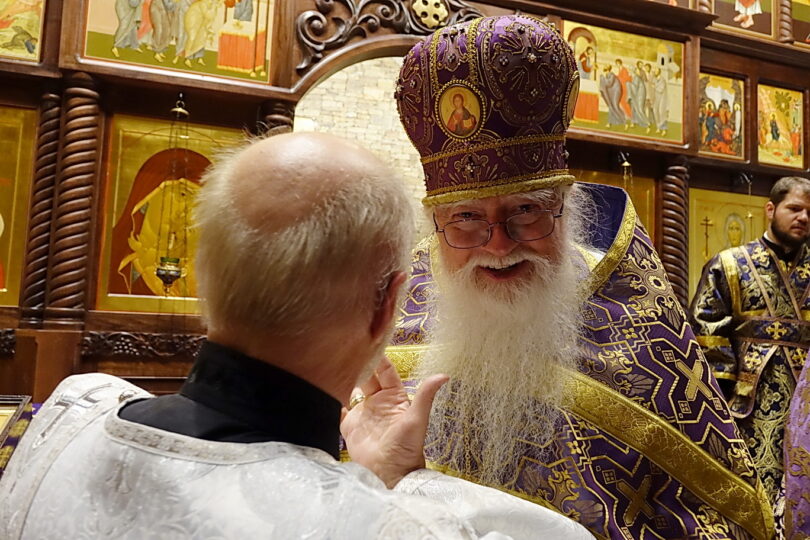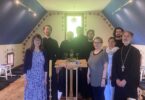When I was serving in St. Mary of Egypt Church in Roswell, Georgia this year, I could not help but think: how can it be that, on an average August Sunday in Georgia, people were taking communion from three chalices? (More or as many as there would be on the same day in Holy Trinity Monastery in Jordanville…)
A while ago I interviewed Fr. Jonah Campbell, a ROCOR priest in West Virginia. Fr. Jonah reflected upon the mission of a parish in the following words: “[I]f you take 100 parishioners, 100 people in the church and you say, we’ve got three doctors and two lawyers and four nurses and five people that work in factories and this many white people and that many black people et cetera. And then you compare that to the normal cross-section of society, are they the same? If they are the same then it means that we’re doing the work that we are being asked to do, we are finding a way to reach everyone. And if they’re not the same, then I really believe that brings up important questions that need to be examined.” What I saw at St. Mary of Egypt makes me to believe that the congregation would pass Fr. Jonah’s “test” just fine.
Like any human life, the history of the parish cannot be painted entirely in rosy colors. Fr. John with a group of parishioners left the Orthodox Church in America in 1997 because of “controversy over baptism”. However, this interview is not about the past, but about the present.
The interview taken by Priest Theodore Foley was part of the fulfillment of the requirements for his successful completion of the course Russian Church Abroad Its History and Identity 723, offered in the spring semester of 2024 to graduate students at Holy Trinity Orthodox Seminary. The major paper that Fr. Theodore submitted for this class was his reflection “What’s Up, Brother?”, dedicated to the newly departed father-confessor at St. Mary’s, Priestmonk Alexander (Lisinchuk).
Protodeacon Andrei Psarev
November 19, 2024
So, Father, when St. Mary’s was received into ROCOR did anything change visibly for the parish?
A few things, at that point we were doing a vigil that probably was over four hours long. Bishop Gabriel (Chemodakov) told us, no, we had to cut it down to three. [laugh] Or something like that. It was a little bit too long, I think, at that point. We were trying to do everything well. So, what else? There was just a much better feeling [compared to when St. Mary’s was under the OCA] about some things, we felt cared for in a way. We loved Archbishop Dmitri (Royster) and he may even be a saint, but in some ways we felt, I would say I felt, and I think everybody really felt cared for. We felt, almost, the embrace of the church for us and a great welcome.
And I would say a closer relationship with the hierarch, which was Bishop Gabriel at that time.
In the past when the parish was much more Russian, we still had English services with some Slavonic, we had a rector that barely spoke Russian [referring to Fr. John himself], but all the while there weren’t any ethnic cliques, and if you came and you were seeking the faith you became a brother of everyone here regardless of your nationality, so I wanted to ask you: how was St. Mary’s able to balance having such a strong Russian core and yet keep its missionary mindset?
I believe because the principle we tried to go on here was first: be faithful, be faithful to the Orthodox faith. So, being faithful to the Orthodox faith means loving one another [laugh]. This is the main manifestation of the Christian faith, that we love one another, and end up loving our enemies and all those outside as well. So, I think there was just, I felt very much the love of all the people. And I hope that they felt mine for them. When my spiritual son Fr. Alexander (Lisnichuk)… he showed essentially no partiality whatsoever. He was obviously a native Russian speaker, and born and raised in Kiev. And he embraced, literally, physically and spiritually everybody in the parish and everybody felt that.
I hope they felt my love as well. I was confessing the parish back when it was ninety-something percent Russian. I had questions typed out that I could ask Russian people that didn’t know English. They, out of respect for me, did their very best to put everything in English, and with their Russian I could make out they were trying to tell me in most cases and have at least a few words of advice but I think it was more not so much what was said as it was the love that was manifested in this great mystery of repentance. This was especially manifested by Fr. Alexander who literally embraced physically everybody that went to confession, and spiritually as well, and they felt this love from him, and I hope that they felt my love for them because it was just… I think confession was one of the main, this mystery was one of the main – and so, we put a huge emphasis on it. As the whole church does of course, as a major mystery for growth in the spiritual life.
So, we spent literally more hours on confession than we do anything else except the services themselves during the week. We spend dozens of hours, man hours, so we feel like its completely worth every bit of it. But we emphasize the importance of this love that is expressed mutually in this mystery.
You visited Russia for the reunification, what can you say about your experience, and I wanted to specifically ask: were people in Russia eager to bury the hatchet you think?
Oh, yes! Well, there was if there was no hatchet at all. [laugh] Really, at that point. As far as the faithful there we were received absolutely with open arms and given every possible benefit and expression of hospitality, which Russia is famous for. We felt completely welcome. With the people that were on the street they knew about it because there were signs everywhere that showed Patriarch Alexey and Metropolitan Laurus side by side and it was everywhere throughout the city of Moscow. And people would recognize us as Americans and American priests, and they would come up to us for blessings and congratulate us on what was happening. So, the people knew about it everywhere. Especially the faithful, and it was just an incredibly warm welcome, and a beautiful, loving experience of love and acceptance of one another.
As you might know father in the core ROCOR communities in other parts of the country there was a sharp negative reaction by some to the 2007 reunification, and I’m curious, was there any sort of.. Or what was the reaction to the reunification in the St. Mary’s parish, did you lose anyone over this wonderful event or was it that people generally felt the same as those Russians you met?
We didn’t lose anyone. The people had been asking about it for years before, “Why aren’t we in communion? Communism is over.” So, our people were very definitely, the ones that think about such things, were ready for it and we all were, the clergy all were one mind here about that as well. It was a very great event, and our people were especially pleased because somehow the photographers or television cameramen were fascinated with my old, strange face and kept coming back to me so they were seeing it on television here! [laugh] And the people were quite happy about that: seeing their priest there.
Some people seem to think that the south has more potential for missionary work, compared to other regions of America, what do you feel about this assertion?
I think it’s probably true simply because in the “backwards south,” [laugh] we were a little bit slower coming along to some of the more liberal and materialistic and worldly trends. There’s still a very great interest in religion but more and more people are becoming disappointed I would say, dissatisfied, disappointed, frustrated with their protestant and Roman Catholic and other faiths and are really looking actively for something else because they want very much to be Christians, but they want to be full Christians. So, they’re really looking for the Church.
And, of course, we believe that God is looking for them, pulling them in! And so, in the process we’re getting more, simply because people I think are more open to it and I think that’s an essential part, well I know that’s an essential part of coming into the Church, one has to be open. God rarely forces us, occasionally, St. Paul is an exception, but rarely forces us into His Church.
What do you feel is the future of ROCOR and the Church as a whole in our neck of the woods, I mean in the south specifically?
Well, I think there’s a huge potential, every city and village needs a church, and really, ROCOR is the best one to supply that. I think people who come into some of the more liberal minded or modernistic, however you want to put it, [Orthodox] churches– well in fact we already are seeing that, they’re searching out for the Church that is really committed on the long term to the Orthodox faith and the fullness of it and the truth of it, you might say the strictness of it, but really the fullness of it. And so, really, they’re coming. We were getting many people from other churches coming in and I think when we plant churches in these cities of the south, and we have thousands of them [cities] literally, that people will be drawn to it. A core. And gradually they are drawing other people, so I think we have a potential of huge growth of the church in the south.
Thank you, father, do you have any final comments?
Well, I just thank God that He gave us, that He gave a sinful person such as I, the chance to be part of this, the growth of this church, and the growth of churches in other places as the unworthy dean of this area. And I thank God that He brought us into ROCOR, it was just–my people especially once various… crises manifested themselves in other [Orthodox] churches, they came and thanked me one by one, “Thank you so much for helping decide to bring us into ROCOR!” So, it’s our home. It’s our home, and thank God for it.
Thank you. Thank you for your time, Father.
Conducted by Priest Theodore Foley











